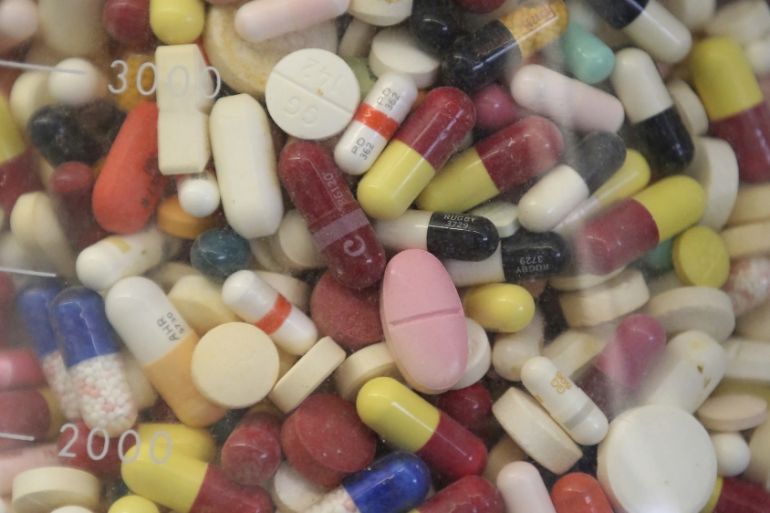Addiction in the US: A corporate morality crisis
Big pharma’s ruthless marketing of opioid painkillers has generated billions of dollars – and millions of addicts.

The arrest of John Kapoor, the founder of US-based pharmaceutical company Insys Therapeutics, is shocking news. He is accused of racketeering, conspiracy, fraud and other felonies. According to the prosecution, he helped devise a plan to bribe doctors into prescribing a fentanyl-based cancer pain drug to non-cancer patients.
What’s shocking about it is that there were criminal charges against people, not just corporations. What’s shocking about it is that Insys Therapeutics was doing exactly what other pharmaceutical companies have been doing to push their opioids and all their medications on patients who may or may not need them.
Keep reading
list of 4 itemsWhat to know about Chinese Olympic swimmers’ doping scandal
West Africa’s Sahel becoming a drug trafficking corridor, UN warns
Behind India’s Manipur conflict: A tale of drugs, armed groups and politics
There is an opioid crisis in the US. And there is no doubt that this addiction crisis is based on pills.
These pills come from legal manufacturers and marketers – companies in the business category called – without intentional irony – “ethical pharmaceuticals“.
The usage of opioid-based painkillers has been pushed aggressively by the sales and marketing forces of the ethical pharmaceutical companies in the way they market all their drugs – seminars that are really expense-paid trips for doctors to sunshine resorts, free samples, speaker fees, coupons to patients for 30-day “starter supplies”, rebates to wholesalers who keep the drugs off of “prior authorisation” lists, and so on.
The “ethical pharmaceutical” companies did something even more basic than that. They manufactured a disease called “chronic pain”. They promoted the idea of making pain “the fifth vital sign” (after pulse, temperature, blood pressure and respiration) that doctors should examine on every visit. To back that up, they created Astroturf groups – American Pain Society, the American Academy of Pain Medicine, Partners Against Pain.
It has become common practice in US medicine, once a medication is invented and patented, to determine, define, even invent, the disease or condition it is a cure for. After it’s been approved for one use, to get doctors to use it for lots of others things
Opioids are a fabulous product. They can be prescribed for almost anything because most things that people go to a doctor for hurt.
Just a few years ago, opioid addiction would have been a dark, shameful – and criminal – secret. Now that it is being created by mainstream corporations and they are profiting from it, it has been normalised. They have made addiction so normal that there are now TV ads promoting taking additional drugs to deal with opioid-induced constipation!
What makes opioids a doubly great product is that they are addictive. Even if a doctor is conscientious and stops prescribing, the patients are likely to continue. They can go to a pill mill, buy on the internet or street dealers, and the product is coming from the same wholesalers and manufacturers.
Addiction, like any other type of popular indulgence, is a socially transmitted condition. Addicts work together. They bring other people in. They, too, normalise addiction, but they do it for the people immediately around them. Beyond treating cancer patients and the dying – where addiction is irrelevant – most of the rest is based on a lie.
In 2016, the CDC finally realised that there was little good evidence that opioids helped chronic pain for more than six weeks. Given how dangerous opioids are known to be, that should have been “discovered” years ago. If more doctors actually paid attention to their patients, they would have realised it long ago.
This takes us to another question. Why did prescribing opioids become so popular, so easily?
It’s a manifestation of the profit-based US healthcare system. The financial structure commends -commands – everyone in the system to fix things as quickly and simply as possible, in a way that is billable by entering a number and that works for the various financial players – insurance companies, pharmaceuticals, large healthcare providers.
The whole system works to promote quick visits and quick fixes.
It’s the same syndrome that has stimulants like Adderall and Ritalin given to children to make them behave in school – which is a pervasive practice almost exclusive to the US.
Dealing with the real causes would be more time-consuming. The solutions might not be covered by insurance or just have a very low time-to-profit ratio.
In a related story, an investigation by 60 Minutes and the Washington Post revealed that the big pharmaceutical companies had sponsored the election campaigns of congressmen who in return promoted a law that stops the prosecution of major corporations for being the drug pushers they are.
All of this fits into the story of a 50-year movement to increase the power of corporations and big money, to alter the legal system to put corporate criminals beyond the law, and to normalise the sort of corruption that has representatives paid to protect corporate excesses, even if they play a big part in 64,000 deaths a year.
That’s what makes the arrest of John Kapoor so shocking. It goes against everything that the US has come to stand for in the corporate age.
The views expressed in this article are the author’s own and do not necessarily reflect Al Jazeera’s editorial policy.
